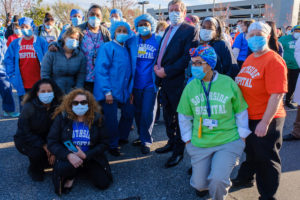A Salute to the Heroes of Northwell Health
What we least expect in life can suddenly occur and impact us like a crashing wave.
Such was the impact of the COVID-19 virus that arrived like a medieval plague in early 2020 spreading contagion and death to the four corners of the earth.
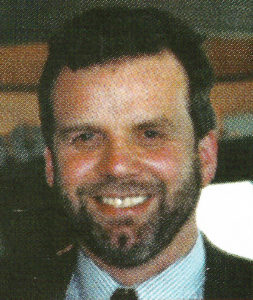
Suddenly, what we had only imagined through historical accounts of other plagues was upon us forcing a crisis like none other. The world faced its gravest crisis since World War II with a defenseless population in over 140 countries suddenly in a fight for their very lives.
At the beginning most efforts seemed like those of King Canute seeking to hold the very waves of the ocean back.
But bit by bit knowledge grew, incredible risks were taken and it finally came down to the caliber of those on the front line.
It was a time for heroes to step forward, to face the fear, the unknown, the pitch darkness and to heed the anguished cries and rush to help.
Because New York was U.S. epicenter for the pandemic the greatest burden fell there. It was a lucky chance because nowhere was their more courage, commitment and care from thousands of frontline workers.
At the heart of the Northwell response was the realization that as the largest hospital system in the state it would face the greatest adversity.
But the virus had chosen a remarkable foe, one that would rise to the occasion in an overwhelming New York way, tough as teak, brave and bold, compassionate to a fault, committed to the bitter end.
Northwell CEO and President Mike Dowling, a Limerick, Ireland native set the tone when he marched from ward to ward at the peak of the battle as 3,500 COVID-19 patients were admitted to Northwell hospitals in early April. Overall Northwell documented over 84,000 COVID-19 patients with more than 17,000 patients admitted to its hospital system.
Unlike other hospital CEOs who led from behind, one at least scurrying to Florida, Dowling led by example inspiring his staff and frontline personnel to new heights.
The gap of danger as the Irish call it, the “Bhearna Bhaoil” are the moments and locations of maximum pressure where only the boldest charge forward at the greatest risk to themselves.
The gap was flooded with Northwell doctors, nurses, first responders, aides, custodians, and helpers.
It was a mighty battle against a mortal enemy. And it was won.
Irish America Magazine is proud to showcase just a few of those heroes in our special section and remember too, those brave souls, staff members and patients who never made it back safely. May their courage inspire us and raise us all up.
The Supply Line
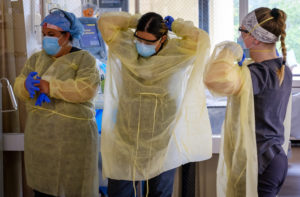 On Monday, January 13, 2020, Phyllis McCready knew there was something wrong with the supply chain for the precious PPE frontline workers relied upon. McCready had been in this line of work for thirty years, ten at Columbia Presbyterian Medical Center and twenty at Northwell. Through years of dealing with hundreds of different vendors of medical equipment and supplies—beds, ventilators, PPE, oxygen, syringes, etc.—she had developed a keen instinct. She knew the business inside and out; knew the companies she could rely upon to ship exactly what she wanted when she wanted it; and knew the companies to avoid. She knew how much equipment she needed in the Northwell warehouse and she knew how much of just about any supply she would need in the next week or month or year. Read more.
On Monday, January 13, 2020, Phyllis McCready knew there was something wrong with the supply chain for the precious PPE frontline workers relied upon. McCready had been in this line of work for thirty years, ten at Columbia Presbyterian Medical Center and twenty at Northwell. Through years of dealing with hundreds of different vendors of medical equipment and supplies—beds, ventilators, PPE, oxygen, syringes, etc.—she had developed a keen instinct. She knew the business inside and out; knew the companies she could rely upon to ship exactly what she wanted when she wanted it; and knew the companies to avoid. She knew how much equipment she needed in the Northwell warehouse and she knew how much of just about any supply she would need in the next week or month or year. Read more.
The Rigors of Science
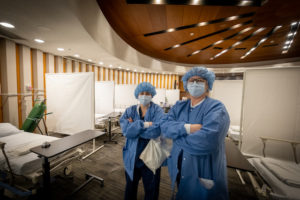 “We’re facing a disease for which there’s no treatment,” said Dr. Kevin Tracey, a neurosurgeon who heads the Feinstein Institutes for Medical Research at Northwell. “Think of what that means. We’re ramping up with preparations to have the hospitals filled up with people in every bed. Some of them dying of a disease, surrounded by doctors and nurses who don’t know what to do because they have never seen the disease. No one has the treatment.”
“We’re facing a disease for which there’s no treatment,” said Dr. Kevin Tracey, a neurosurgeon who heads the Feinstein Institutes for Medical Research at Northwell. “Think of what that means. We’re ramping up with preparations to have the hospitals filled up with people in every bed. Some of them dying of a disease, surrounded by doctors and nurses who don’t know what to do because they have never seen the disease. No one has the treatment.”
The situation, said Tracey, is a tragedy. For a medical researcher, it also creates an obligation because “this is a research problem.” And a piece of a potential solution lay all around Tracey in Northwell’s twenty-three hospitals, which were about to be full of very sick COVID patients—a unique frontline setting for scientific testing. At Northwell, we were in the US epicenter, and others who would later experience the virus would be learning from what we did. Our obligation was to research and educate. Read more.
Hope During the Pandemic
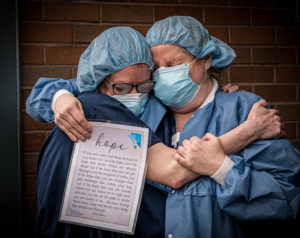 From March to June of 2020 there were many days when it was difficult to have hope that things were going to get better. For many of us we listened to daily news briefings from the President, the Governor, and local elected officials. During those news briefings you hoped to hear good news and that the number of cases and deaths due to COVID-19 were decreasing.
From March to June of 2020 there were many days when it was difficult to have hope that things were going to get better. For many of us we listened to daily news briefings from the President, the Governor, and local elected officials. During those news briefings you hoped to hear good news and that the number of cases and deaths due to COVID-19 were decreasing.
The crafty among us started making masks, restaurants set-up daily food deliveries to hospitals, and people took to the streets each evening to play music and bang pots and pans as a sign of appreciation to all the essential workers.
As this was happening the healthcare workers needed to start to celebrate the small victories they were seeing, the decreasing number of positive cases, less death, and people that were once severely ill leaving the hospital. Read more.
Hope Huddles
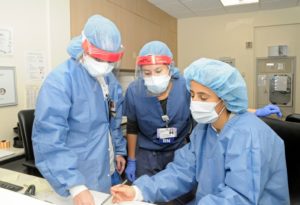 Emily Fawcett, RN, is a float nurse working on one of Lenox Hill Hospital’s COVID-19 units. But she started a recent shift in the emergency department to help launch an initiative that promises to provide positivity to her fellow front-line health care workers — something she calls “Hope Huddles.”
Emily Fawcett, RN, is a float nurse working on one of Lenox Hill Hospital’s COVID-19 units. But she started a recent shift in the emergency department to help launch an initiative that promises to provide positivity to her fellow front-line health care workers — something she calls “Hope Huddles.”
Shift changes in an emergency department are marked by a quick meeting of departing and arriving nurses. Called a “huddle,” nurse leaders review cases and the events of the prior shift to ensure smooth transition of patient care. But before digging into the details, Nurse Manager Silvia Cota turned it over to Ms. Fawcett and another nurse working on a COVID-19 unit.
“We’ve had 5 extubations in the last few days,” said Catherine Chaplin, RN, who also works on a COVID-19 unit. “I extubated a young man who, by the end of the day, was asking me out — so he’s doing OK.” Read more.
The Angel of Environmental Services
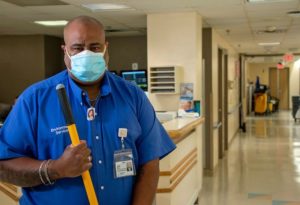 In environmental services, we go above and beyond to make our patients feel comfortable and keep a clean environment. During COVID-19, we became their loved ones when their families couldn’t be there and helped comfort them in their final moments. I’ve faithfully worked for Staten Island University Hospital for eleven years, and travel three hours each way from my home in Yonkers on public transportation to help care for patients.
In environmental services, we go above and beyond to make our patients feel comfortable and keep a clean environment. During COVID-19, we became their loved ones when their families couldn’t be there and helped comfort them in their final moments. I’ve faithfully worked for Staten Island University Hospital for eleven years, and travel three hours each way from my home in Yonkers on public transportation to help care for patients.
I’m not a clinical care provider, but my dedication to patient safety in the Environmental Services (EVS) Department is what I strive for. My coworkers and I are at the top of our field when it comes to bedside manner and being spirited patient professionals. Unfortunately, our team is no stranger to a crisis. We saw the hospital through the evacuation ahead of Hurricane Irene, the aftermath from Superstorm Sandy the following year, and even the Ebola crisis in 2014. Read more.
Patients are the True Heroes
A lot of people are calling health care workers the heroes of the COVID-19 pandemic. This is certainly true in many respects. But, as a nurse practitioner at Lenox Hill Hospital,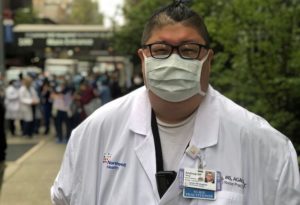 my patients and their families are really the brave ones.
my patients and their families are really the brave ones.
As nurses, we find hope in those families that are able to support their loved ones at their most vulnerable moments. And during this situation, we all need hope, especially those of us on the front lines. For our patients, though, those critical moments are most often experienced in isolation, because families are not able to be present with their parents, spouse or children. Some are able to communicate remotely. Others are simply too tired, too sick or too depressed.
Only then is when we step in.
COVID-19 patients are the courageous ones, enduring a wide range of symptoms that, before two months ago, no one knew how to treat. No one knew how quickly their condition would progress. And no one knew what their outcome would be. To experience that — mostly on their own — is nothing short of heroic. Read more.
Leading Through A Pandemic
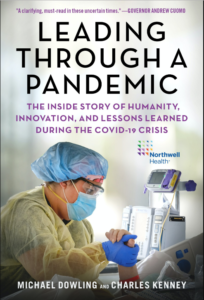 The coronavirus, the greatest public health crisis in United States history, will spawn a thousand books, TV programs, and even movies.
The coronavirus, the greatest public health crisis in United States history, will spawn a thousand books, TV programs, and even movies.
However, I doubt any will be as revealing and relevant as “Leading Through a Pandemic” which is written by Irish-born Michael Dowling, Chairman and CEO of Northwell Health, one of the largest hospital groups in America, and co-authored by Charles Kenney, the Chief Journalist at Northwell Health.
Dowling set out to write the manual on how to tackle a pandemic based on the titanic struggle his own hospital group Northwell Health encountered as the 23 hospitals, nearly 800 outpatient facilities, and 73,000 employees faced into the eye of the storm. No other hospital group faced such numbers.
When the first wave was over, more than 80,000 COVID patients had passed through the Northwell system. Because of adequate preparation and specific plan of action to deal with the deluge, far more patients survived than even the experts thought possible. Read more.
Michael Dowling
Michael Dowling is one of the most one of the nation’s most influential health care executives. He has rapidly expanded and successfully revolutionized Northwell Health, formerly North Shore-LIJ Health System, since becoming president and CEO in 2002, and as COVID-19 swept throughout New York State, he and his staff rose to the occasion, helped to stem the tide, and save thousands of lives.
Northwell’s call to arms has not gone unnoticed. Governor Cuomo, citing Dowling’s leadership, and the extraordinary job that Northwell did in the early days of the pandemic, asked Dowling to lead the effort to coordinate the COVID responses of other hospital networks in the state.
“He is one of the really beautiful and brilliant leaders in this state,” Cuomo said in one of his televised briefings with Dowling by his side. Read more.
A Message from Michael Dowling
Irish America wishes to extend a special thank you to the Public Relations team at Northwell Health for their help in creating this tribute to the Heroes of Northwell Health including but not limited to Chris Gasiewski, Chris Suchy, photographer Lee Weissman, and video editor Rob Hoell.

